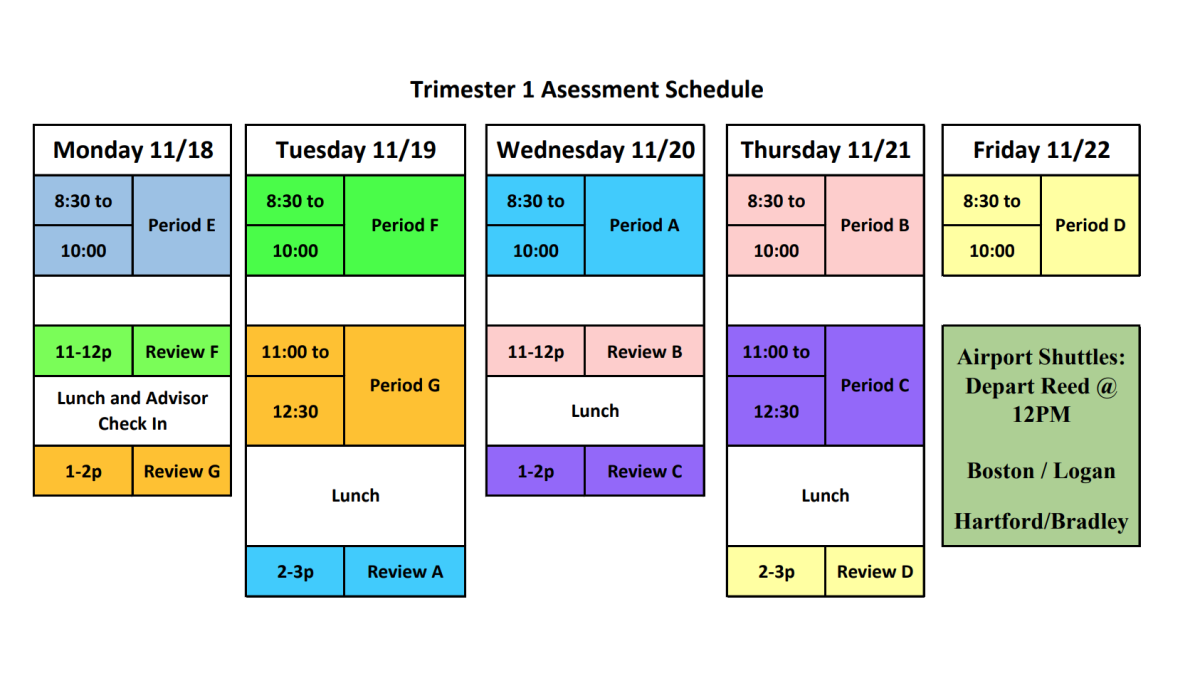Assessment week can be very stressful for students, but the week before may be even more stressful.
To guarantee they cover all necessary material, teachers often try to wrap up as much material as possible ahead of the close of the trimester. The result is often an increased workload for students during the week before assessments, adding stress for students during an already stressful time in the trimester. Finding ways to relieve stress is among the most important things for students to do at this time.
Assessment week is meant to be a time when students’ learning over a trimester is evaluated in a culminating assignment. Williston works hard to ensure that students have ample time to prepare by providing scheduled review periods and “‘luxurious buffers” between testing blocks as Kimberly Polin, Academic Dean, calls them. Students appreciate the flexibility they have during assessment week itself, but the green week before can be a different story.
Malaya Anaba, a senior boarder from Fishers, Ind., feels like teachers often try to wrap up any final material during the weeks leading up to assessments.
“Especially in the past two weeks, [teachers] are trying to cram in the last tests and quizzes and a lot of homework stuff, so my last two weeks in Veracross have been like five assignments every day even on days when I don’t have a full five classes,” she said.
Not only does the anticipated pressure of assessments increase stress during this time, but heavier workload does as well.
Pearl Rungrotkitiyot, a senior boarder from Thailand, feels amplified stress due to the additional pressure of college applications being due around this time.
“[The week before assessments] has been really stressful for me because I take hard classes, [sol it kind of has to be stressful but also [the] college [application process] plus school work is just horrible,” she said.
This stress is different for everyone on campus, but it seems that each member of our community is recognizing and experiencing it in one way or another.
In her time at Williston, Anne Zager, a Licensed Clinical Social Worker and Counselor, has noticed varying levels Of stress during assessment season of each trimester. This year in particular, seems to be a slightly lighter cycle for a multitude of reasons.
“This week has been stressful for students, but it doesn’t seem to have been overwhelming. It’s been an intense fall for multiple reasons and in multiple ways. With a loss on campus, the two blue weeks [in a row], and an election cycle that was hard for people in different ways, maybe there was a little breath this week and the end is in Sight,” she said.
Williston’s faculty members are very understanding and encourage students to advocate for themselves, especially when feeling intensified stress during these weeks.
Jessi Johnson, a Computer Science teacher at Williston, notices the increased stress that often accompanies assessment week and the week leading up to it. She has also altered her teaching plans to accommodate for this.
“l think that there tends to be a lot of stress during the week before and sometimes tests get assigned all at once and then it feels like another assessment week before assessment week, so I try to make the load a little lighter before by not giving a test [that week],” she said.
Although some teachers are giving lighter loads, some students still feel overwhelmed with work, and stress management strategies become more important.
Zager encourages students to focus On self care and building study breaks into their schedules, especially exercise.
“As athletics end for some people and some people don ‘t have sports now after school, still taking a walk and getting some form of exercise is really important,” Zager said. “The more that you can feel holistically well, the better things will usually feel overall.”
Zager is not the only one who recognizes this connection and its importance: many professionals in this field agree. In an Oct. 9 article in The New York Times about strategies for de-stressing, author Danielle Friedman said, “moving the body can help quiet the mind.”
Colenback and Zager also encourage students to plan out specific times when they are going to study and get their work done. This strategy can help with time management and the anticipatory stress that often comes with assessment week.
Each student has different strategies for managing stress and getting their work done during assessment week, and many of them are rooted in finding what works best for each individual. Pearl and Malaya like to block out specific times in their daily schedules to get things done. Pearl also tries to treat assessment week like any other week in order to maintain a good work-life balance during a more stressful time in the trimester.
“It’s all about balance,” she said. “You want to study, you want to work hard, but you also want to give yourself a break and sleep because if you don’t sleep, nothing will stick in your head.”















